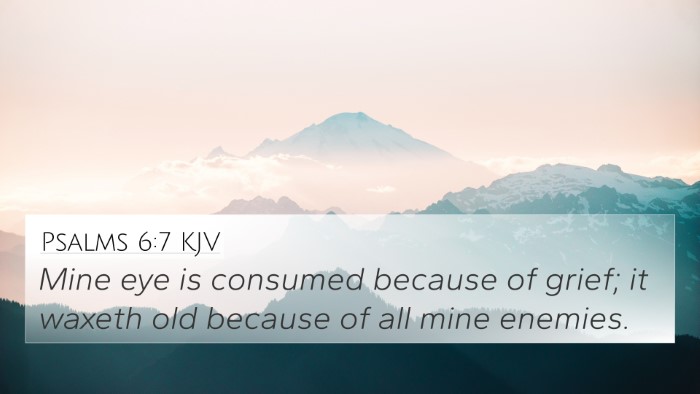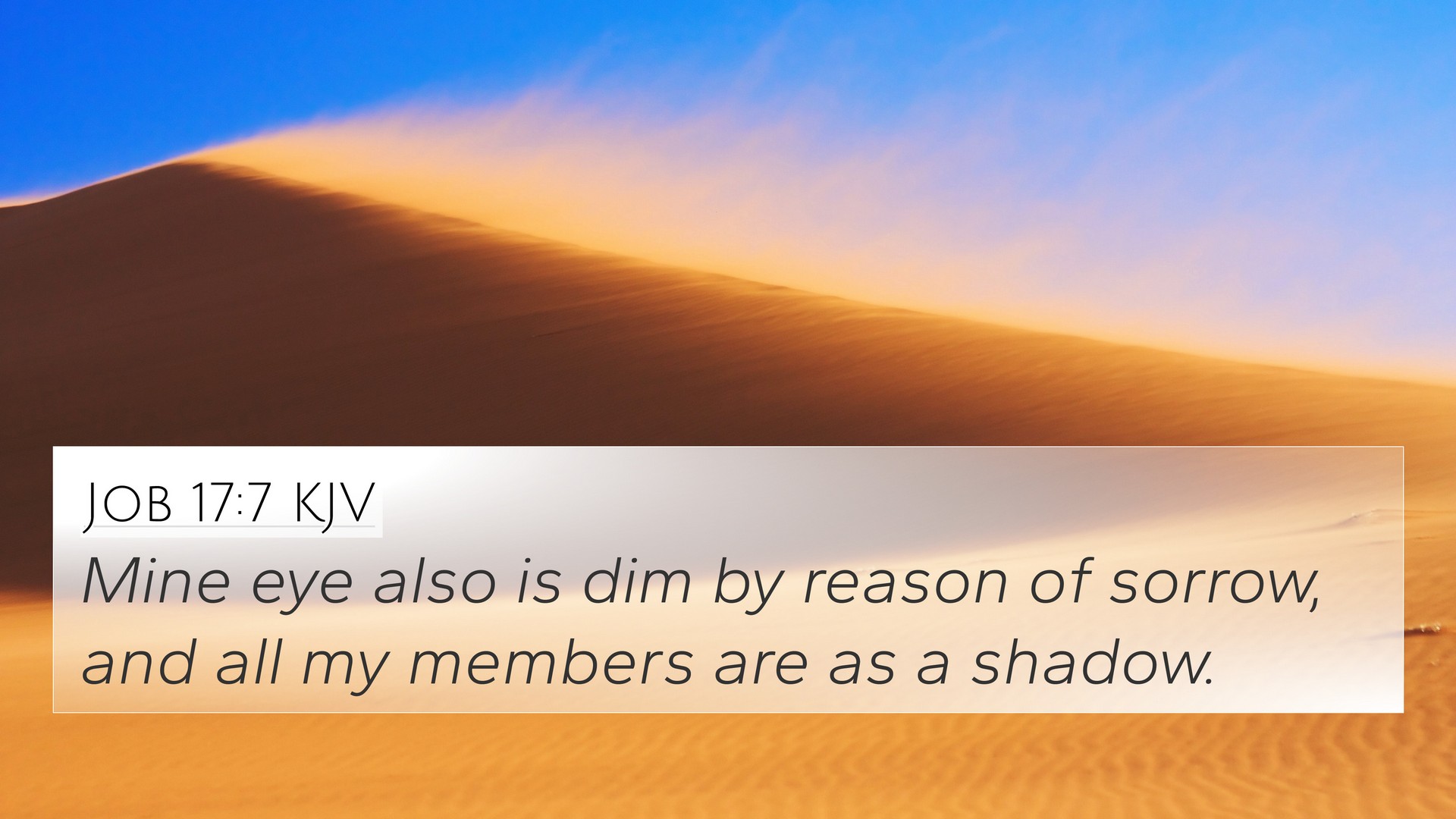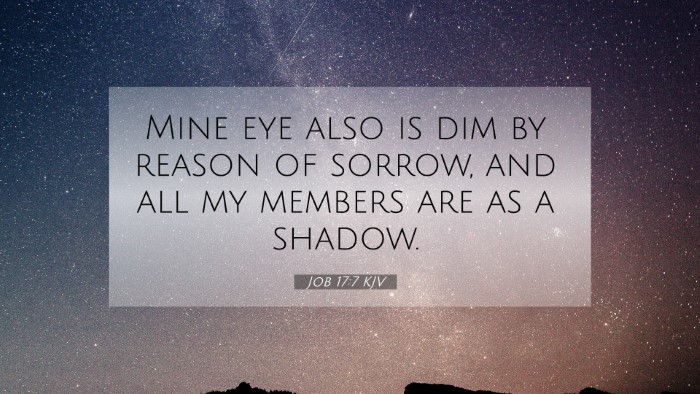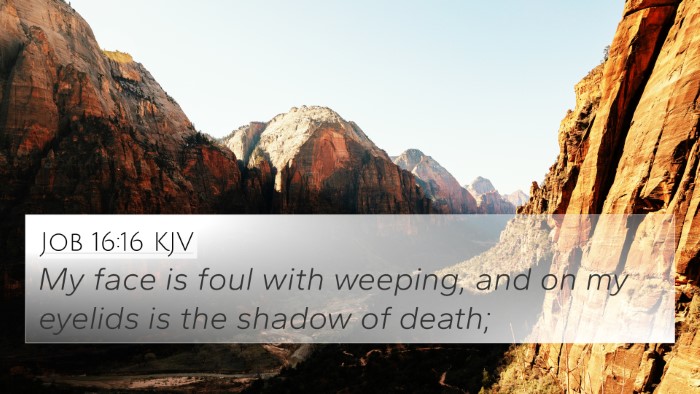Old Testament
Genesis Exodus Leviticus Numbers Deuteronomy Joshua Judges Ruth 1 Samuel 2 Samuel 1 Kings 2 Kings 1 Chronicles 2 Chronicles Ezra Nehemiah Esther Job Psalms Proverbs Ecclesiastes Song of Solomon Isaiah Jeremiah Lamentations Ezekiel Daniel Hosea Joel Amos Obadiah Jonah Micah Nahum Habakkuk Zephaniah Haggai Zechariah MalachiJob 17:7 Similar Verses
Job 17:7 Cross References
Mine eye also is dim by reason of sorrow, and all my members are as a shadow.
Uncover the Rich Themes and Topics of This Bible Verse
Listed below are the Bible themes associated with Job 17:7. We invite you to explore each theme to gain deeper insights into the Scriptures.
Job 17:7 Cross Reference Verses
This section features a detailed cross-reference designed to enrich your understanding of the Scriptures. Below, you will find carefully selected verses that echo the themes and teachings related to Job 17:7 KJV. Click on any image to explore detailed analyses of related Bible verses and uncover deeper theological insights.

Psalms 31:9 (KJV) »
Have mercy upon me, O LORD, for I am in trouble: mine eye is consumed with grief, yea, my soul and my belly.

Psalms 6:7 (KJV) »
Mine eye is consumed because of grief; it waxeth old because of all mine enemies.

Job 16:8 (KJV) »
And thou hast filled me with wrinkles, which is a witness against me: and my leanness rising up in me beareth witness to my face.

Psalms 109:23 (KJV) »
I am gone like the shadow when it declineth: I am tossed up and down as the locust.

Ecclesiastes 6:12 (KJV) »
For who knoweth what is good for man in this life, all the days of his vain life which he spendeth as a shadow? for who can tell a man what shall be after him under the sun?
Job 17:7 Verse Analysis and Similar Verses
Understanding Job 17:7
Job 17:7 states: "My eye is dim by reason of sorrow, and all my members are as a shadow." This verse is laden with existential despair, reflecting Job's physical and emotional suffering. To grasp the full depth of this verse, we can draw insights from esteemed public domain commentaries, such as those by Matthew Henry, Albert Barnes, and Adam Clarke.
Contextual Insights from Commentaries
Job, a man of great faith and integrity, finds himself amid profound anguish after losing everything dear to him: his health, wealth, and family. His state of sorrow causes not only a physical dimness in his eyes but also a broader sense of despair in his entire being.
- Matthew Henry: Henry emphasizes that this dimness represents Job's overwhelming sorrow. His eyes, once bright, are now no longer able to see hope due to the weight of his troubles. This portrays the psychological anguish that often accompanies physical suffering.
- Albert Barnes: Barnes notes that the "shadow" metaphor signifies Job's feeling of emptiness. His physical form feels insubstantial, almost ghostly, signifying that his essence is fading away under the burden of pain and loss.
- Adam Clarke: Clarke elaborates on the idea that Job’s plight serves as a universal commentary on human suffering. He indicates that, despite Job's fidelity to God, he does not escape suffering, suggesting that pain is not always a result of wrongdoing.
Thematic Connections and Cross-References
Job 17:7 invites a multitude of Bible verse cross-references, illuminating similar themes of despair, suffering, and perseverance in faith. Here are a few significant connections:
- Psalms 6:7: "My eye wastes away because of grief; it grows old because of all my enemies." This verse mirrors Job's lament and highlights the toll of sorrow on one's spirit.
- Psalms 38:10: "My heart pants, my strength fails; as for the light of my eyes, it also has gone from me." Here, exhaustion manifests similarly in both Psalms and Job, indicating a distressing plight.
- Lamentations 3:51: "My eye affects my heart because of all the daughters of my city." This verse captures the interconnectedness of sight and sorrow, much like Job’s dimmed vision due to despair.
- Isaiah 38:10-12: These passages depict Hezekiah's lament during illness, resonating with Job's feelings of mortality and the shadow of death in his sufferings.
- James 5:11: "Indeed we count them blessed who endure. You have heard of the perseverance of Job." Here, Job is expounded upon as an archetype of endurance amidst suffering.
- Revelation 21:4: This future hope illuminates a resolution to suffering: "He will wipe away every tear from their eyes, and death shall be no more." It hints at a promise contrasting Job's present anguish.
- 2 Corinthians 4:16-18: "So we do not lose heart. Though our outer self is wasting away, our inner self is being renewed day by day." This verse aligns with Job's experience while providing hope through suffering.
- Philippians 3:20-21: These verses offer assurance of transformation and healing, a perspective that Job would yearn for in his current state.
- Romans 8:18: "For I consider that the sufferings of this present time are not worth comparing with the glory that is to be revealed to us." This connects to Job's moment of suffering while promising relief to believers.
- Matthew 5:4: "Blessed are those who mourn, for they shall be comforted." This is a reminder that sadness is a part of life, but comfort will ultimately be bestowed upon the grieving.
Conclusion: Links Between Scriptures
Job 17:7 encapsulates the profound emotional and physical struggles inherent in life. By examining this verse alongside others, we discover a rich tapestry of connections between Bible verses that reveal the overarching themes of suffering and divine hope. As noted by scholars, the journey through despair, as seen with Job, resonates with numerous biblical accounts, providing depth and relatability from the Old Testament to the New Testament.
Further Study and Resources
For those seeking to enhance their understanding of such scriptures, employing tools for Bible cross-referencing like a Bible concordance or a Bible cross-reference guide can deepen your grasp of the inter-Biblical dialogue present in scripture. Engaging with a Bible reference resource will facilitate a cross-reference Bible study as you explore the heartfelt laments of Job alongside other biblical narratives.




